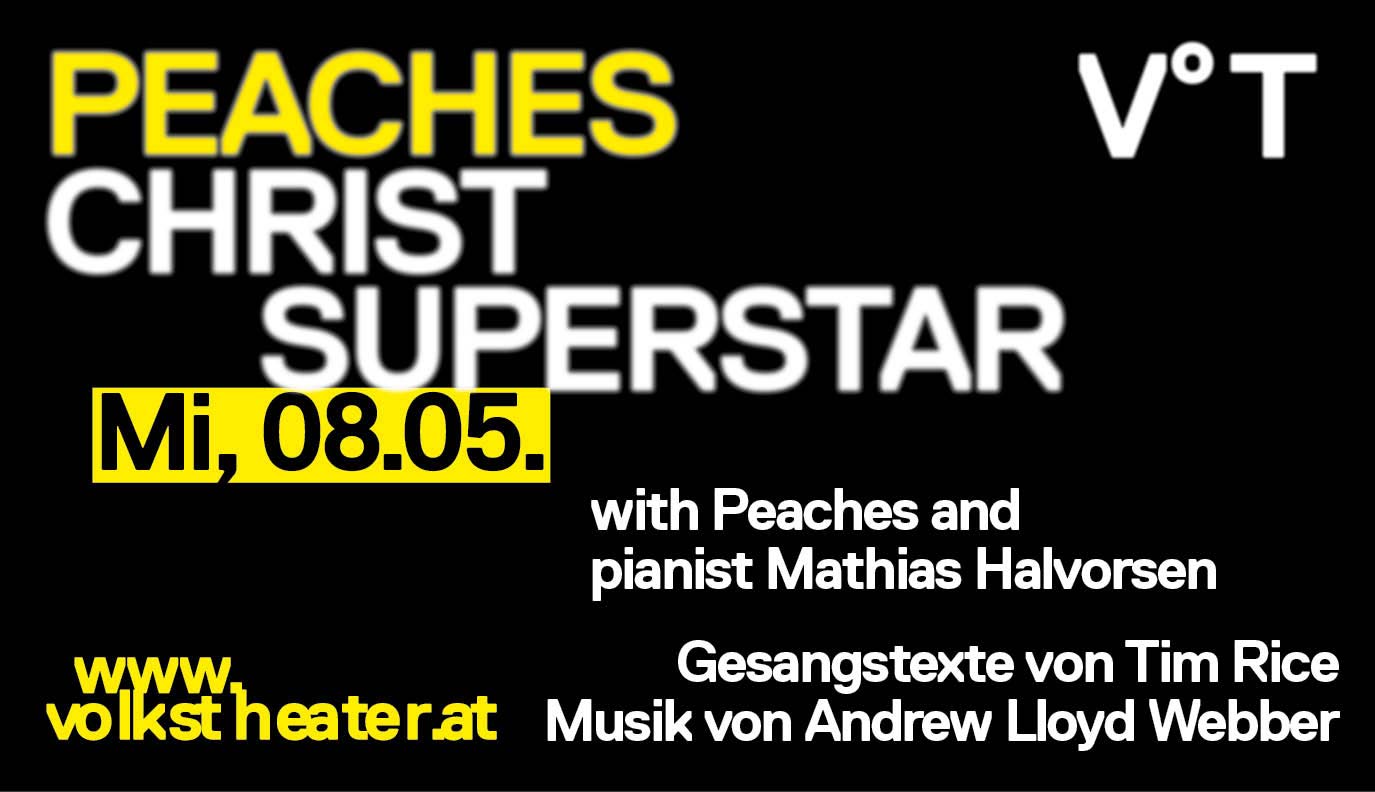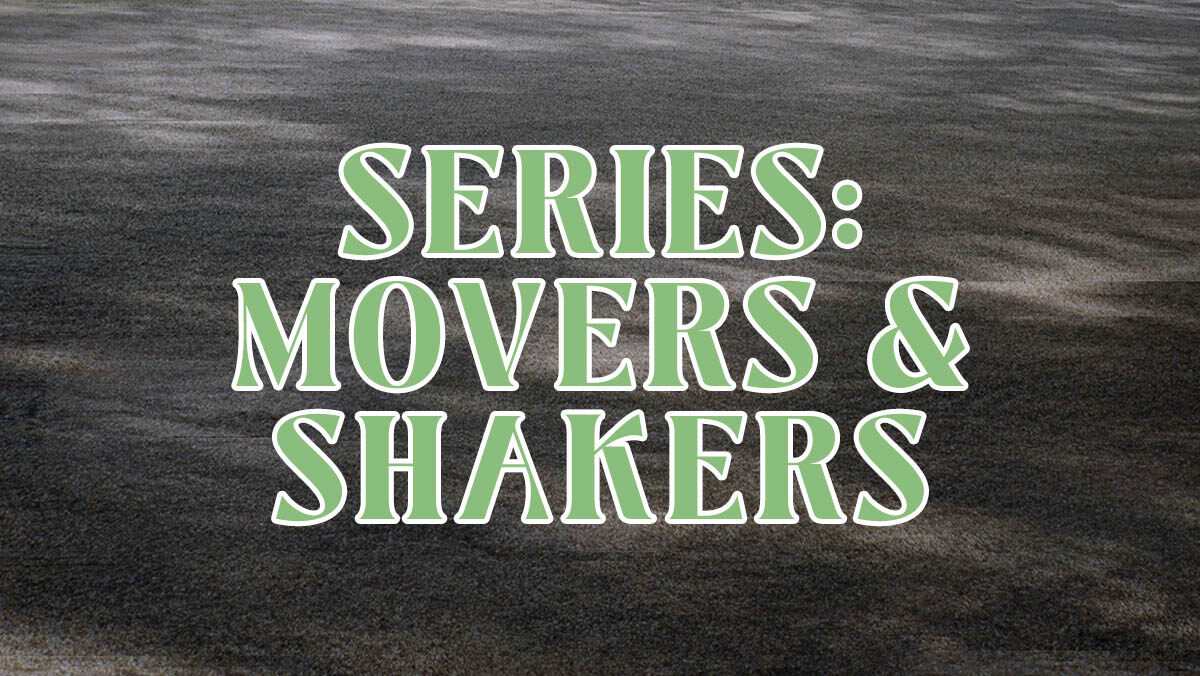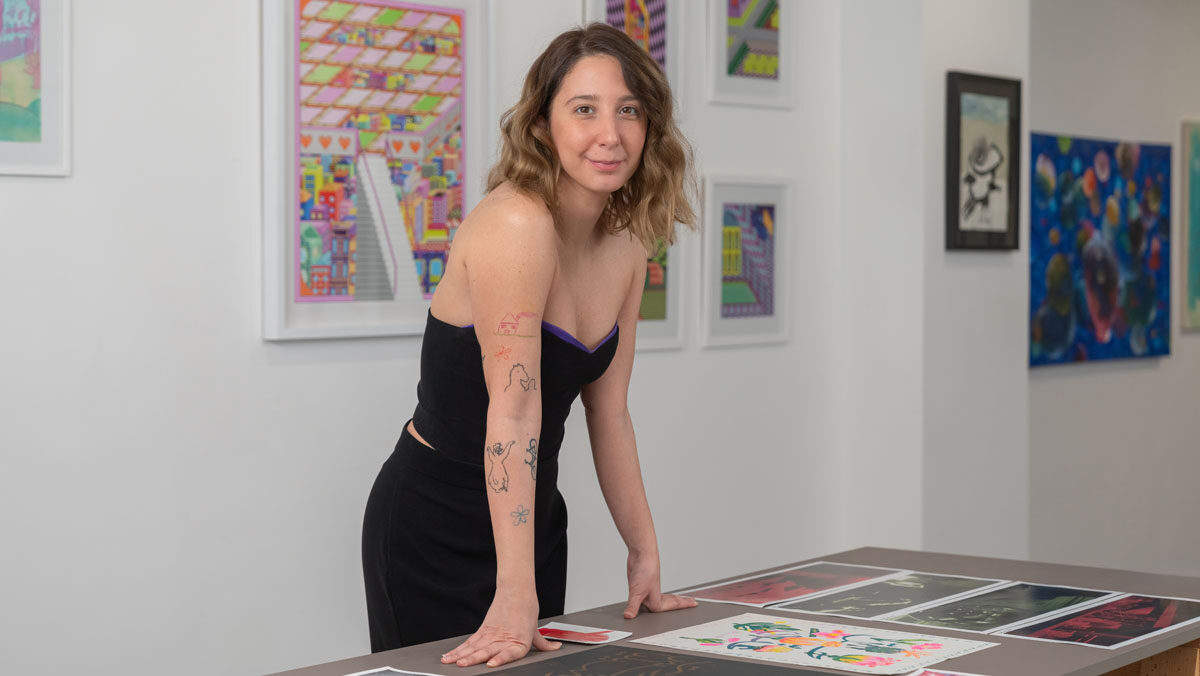
The name of Lynn’s gallery project was a topic of debate in an online session. We all shared the opinion that Lynn Modallal was such a beautiful sounding name, why not use it for the gallery that she was dreaming of? Not long after, Lynn founded her gallery in Beirut, taking our advice. A year on, I check in to see how Lynn Modallal Gallery is doing.
Lynn laughs when I ask. “The name is motivating me to do my best because it is my name on the display. So I have no other choice but to work! Yes, it was a good thing that I called the gallery after my name. The art scene is about the name of the gallerist, the curator, the artist. Now people know: this artist works with me and is exhibiting at my gallery. It is super clear. I like it!
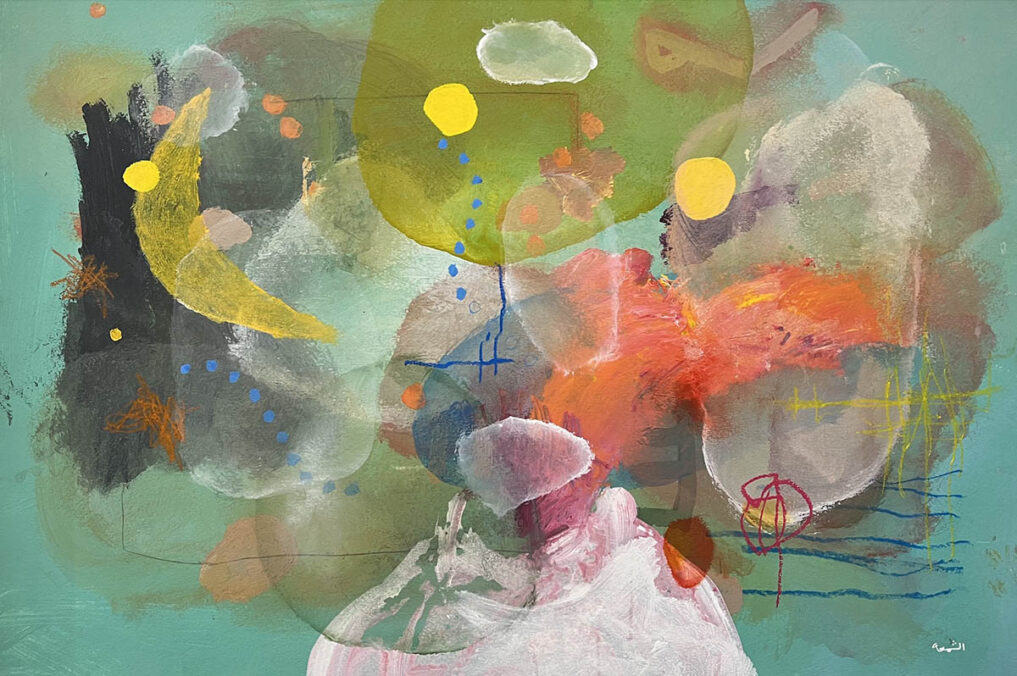
Aquatones – Fadi ElChamaa (2023)Mixed Media on Paper Marouflage on Canvas
75 x 110 cm
Season 1, Episode 1*
An Paenhuysen: Starting a gallery is not an easy thing to do. How did it come about?
Lynn Modallal: I had concepts in mind that I wanted to do in my own way. I never thought that I would open an art gallery. But whenever I wanted to share a concept with another gallerist or even apply for funding, I didn’t feel that my vision was getting the right space. I needed to play with the space, with the concepts. I decided to open a gallery to create a new experience. My goal is to create not only a space to showcase art, but also to create an accessible experience.
Where is your space? Is it in Beirut city center?
I was extremely lucky to find a space in the heart of Beirut. In the same street in Gemmayze Beirut we have three other galleries, and each of them has a different identity. People are walking by and they can enjoy different kinds of experiences.
How would you describe your gallery’s identity?
In every exhibition, I try to evoke a feeling of peace, a break with the anxiety that we have. The first exhibition was titled Not Today. It was a postmodern exhibition, where the artists had to imagine a futuristic world with elements of the past. I provided a space for the artists and audience to take a break of today and to have a nice trip into another world.
So that’s the core aim with the gallery?
I want to become a cultural hub. The space is very welcoming, extremely calming. I am planning to do talks about the cultural scene, and more workshops.
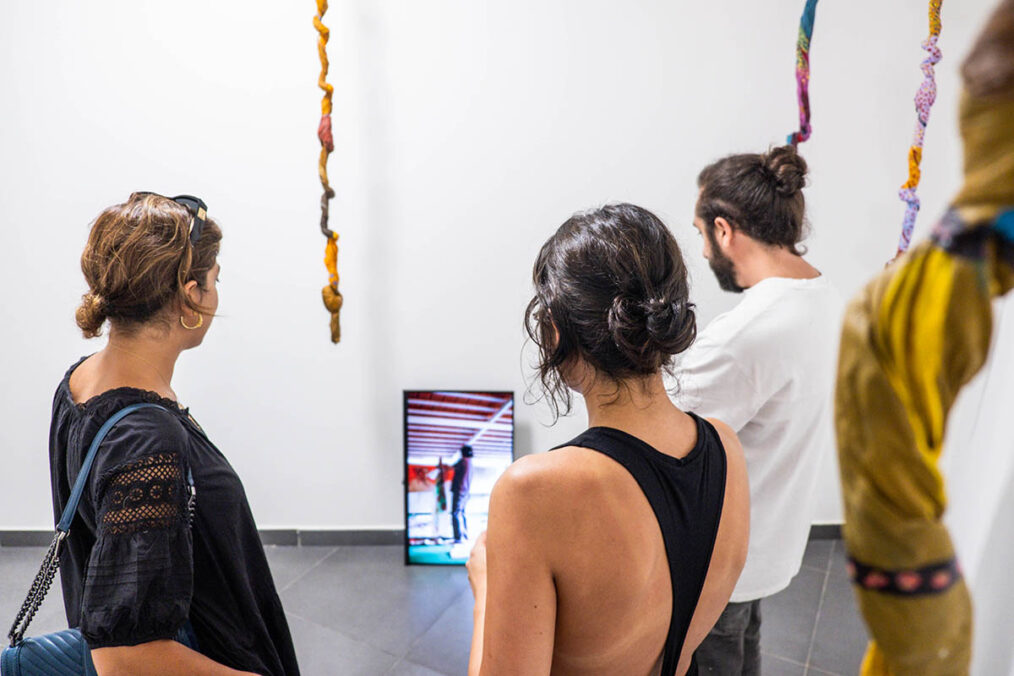
Transformations (2011-) – Fadi ElChamaa Installation at Lynn Modallal Gallery, Beirut
And then, this first group exhibition was followed by a busy program.
Yes, I had three solo exhibitions. The first one was by Fadi ElChamaa. He is one of my favourite Lebanese artists. He is an older, established artist but he is one of the most progressive artists I have worked with. His abstract works are created with thin layers. He expresses the transformation and the ever evolving world we live in in a most light and vibrant way. I think that his style is really relevant right now. He is right on point with his playfulness.
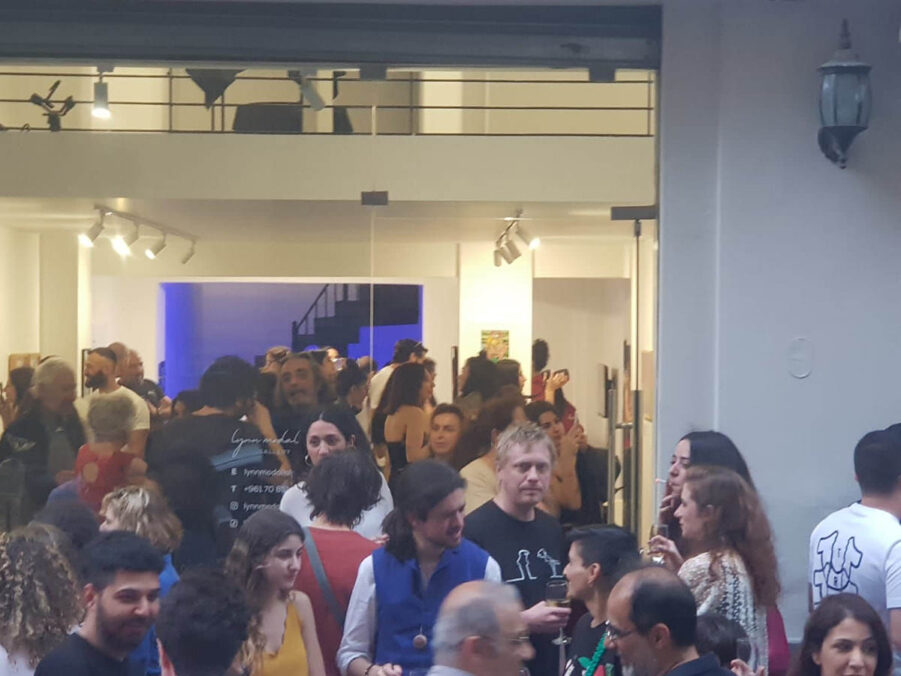
NOT TODAY Collective Exhibition Opening at Lynn Modallal Gallery, Beirut
We’ve talked about the political situation before. How are you dealing with that today?
It was extremely hard. I don’t want to make the situation about me because it’s absolutely not, but it was hard. I was wondering if I should close the gallery and go back to being an art dealer. I was out of ideas. I had done the programming for the year, I had people in mind, as artists and as an audience. And, suddenly, everything changed.
Also, we are not a generation who decides to look at the news whenever we want. We have social media 24/7. Even as a standup comedian, I lost my sense of humour. I was extremely anxious all the time. It was difficult but I didn’t want to stop yet. I needed to give it another try.
This May, we are celebrating the anniversary of the opening of the gallery with another group exhibition. It is about nostalgia, about diving into the childhood of the artist. Whereas the first exhibition was a futuristic one, this one is about the past. Anything but today.
So it’s very much about looking back and looking forward?
My focus is on multidisciplinary artists with a new voice and on young collectors. I have a few established artists who are the umbrella of the gallery, but I focus on exhibitions of upcoming and promising artists that I truly believe in.
I also try to reach new collectors who can enjoy a Friday night at the gallery, meet the artists and enjoy the music without being intimidated. The location of the gallery is near all the bars of Beirut. Everybody can come have a drink and continue their night. Most galleries do their openings on a Thursday, but I wanted to open my exhibitions on a Friday night so people can come and go out.
Your last exhibition was about the city Beirut itself: Beirut Nejma.
Nejma means star. It was about the relationship of the artist with the city. We all have this toxic relationship with Beirut. On paper, the city is not going well. All the artists I am working with, even the expats, are always waiting for the day that they can come back, they are always happier when they are in Beirut. I asked locals and expats to describe the relationship with Beirut. Even if the city is dimmed, why is it that bright in our mind? As a gallerist I travel a lot, but the witness and the community I have in Beirut, I can’t find it in another place.
So, how is that specifically about Beirut?
I think that Lebanese people are extremely witty and fast. I hate the word “resilient” because I don’t want to romanticise our situation. It sucks, economically, socially, etc. But we are smart, we always find a way to work through anything. Honestly, I have been working for five years in the art scene. Lebanese people love art and love luxury, no matter what the situation is. I feel there is a beauty in that.
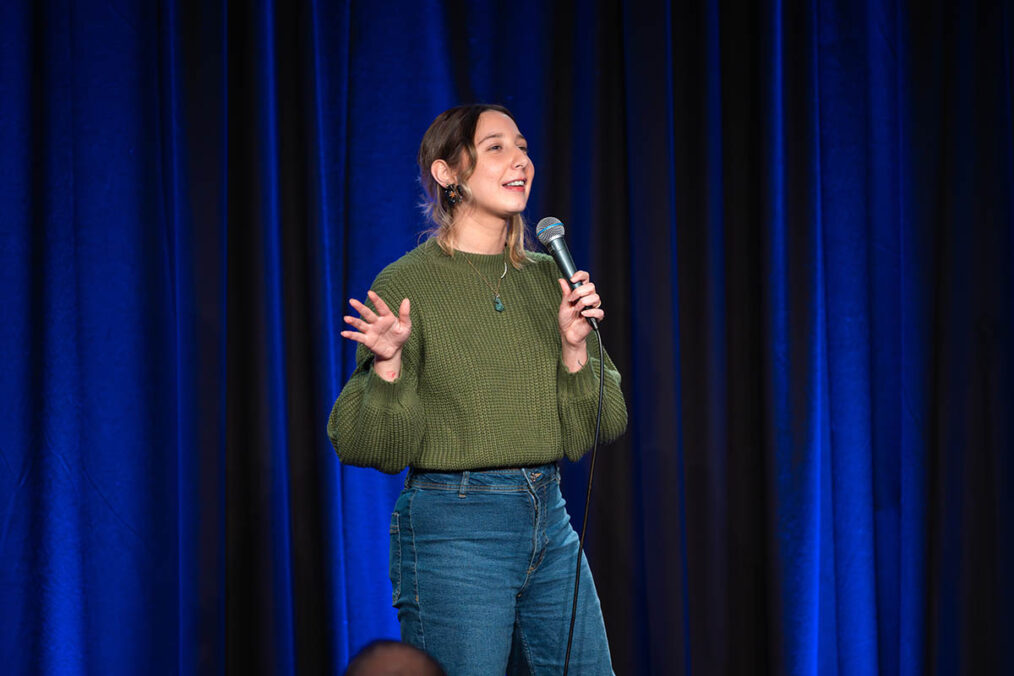
Lynn Modallal Performing at awk.word, Photo courtesy François Chahine
Talking about wittiness, I‘ve never met a gallerist who’s a stand-up comedian!
It is amazing! I feel like I have this unique identity. They compliment each other. I am a gallerist who has a business and responsibilities. But the minute that I am on stage, I am roasting everything. This vulnerability that I am showing on stage is beneficial for me as a gallerist. They see the real me. It gives me credibility. I am not in denial, I know the situation, what we are going through. Art is my career but I also have the space to get everything off my chest and to talk about stuff that people can relate to. I am unfiltered as a comedian.
You can’t wear a mask as a comedian.
Yes, it is raw. I feel like the world is changing, even on social media. People no longer like the filtered and clean picture. They like the real picture, of anything! They appreciate someone who is spontaneous and real.
Are there any Beirut artists that we should follow?
Fadi ElChamaa, who I mentioned before: he knows what to do, always. There is a photographer called Luana Bassil. She is based in Belgium. She takes nude photography and puts her subject in a fantastic baroque environment. Noemie Naoumi a Lebanese author and artist based in France, she is known for her comic book „The Importance of Nose Hair“. Nour Choukeir, she is a visual artist and art director based in Milan. There is an emerging artist, Joelle Jabbour, who works with architecture software AutoCad inspired by 1980s video games. I also have admiration for artists that are not at the gallery, but I’m not going to tell! (Laughs)
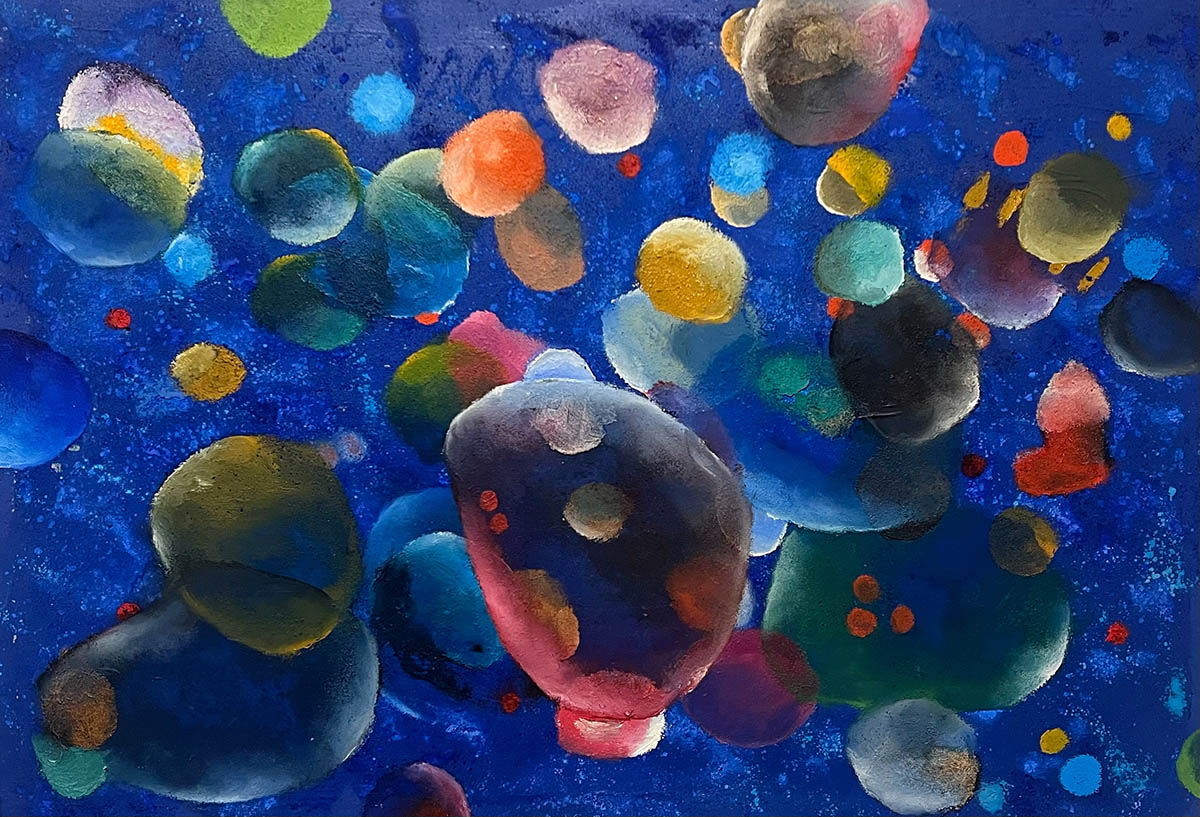
En Route – Fadi ElChamaa (2023)Mixed Media on Canvas
75 x 110 cm
Where do you find your artists?
I am a stalker. I knew five years ago who were the artists I wanted to work with. They are working well on their brand, their name, their artistic growth. I do my research, I used to work as a researcher for TV. I like to look for talents. Looking for talents is what made me a gallerist!
I like to look for talents. Looking for talents is what made me a gallerist!
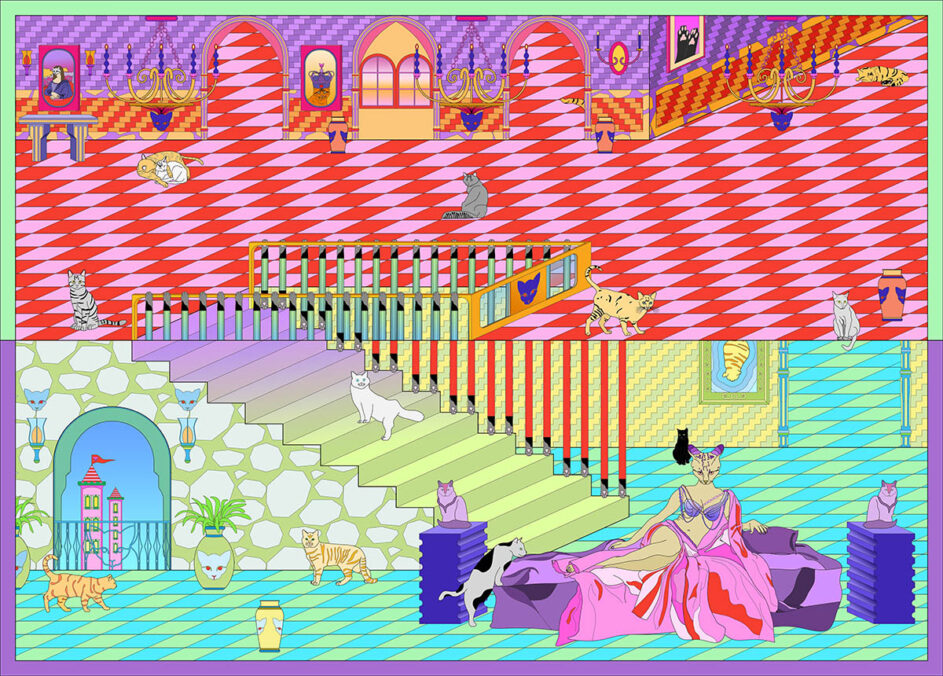
CleoCatra – Joelle Jabbour (2023)Created on AutoCad – Ink on proofing paper (Limited Edition of 10 Copies)
45 x 62 cm
45 x 62 cm
What’s the comedy scene like in Beirut?
What is nice about the stand-up comedy scene here in Beirut, is that it is very diverse thanks to the stand up comedy platform awk.word. I personally don’t talk about politics at all. Before doing so, I need to tackle the foundation of a human being. Talking on stage helps me learn, but also so does bombing on stage, not doing well. When I bomb, the level of embarrassment on stage makes me think and helps me grow. Your ego is shrinking, you know! (laughs) And this makes me a humble gallerist.
Contact and address:
Lynn Modallal Gallery
Gouraud, Beirut, Libanon
www.lynnmodallalgallery.com
*Curating, writing and teaching brings An Paenhuysen to many places in the art world, from an artist studio in the 22-story tall Meritomi in Helsinki, a senseless residency in Milan, to the Kempinski hotel in Dhahran. Often, on those journeys, she meets people who are doing something interesting, different and new. In this series, you will read about these encounters with artists, publishers, researchers, gallerists, curators that gave off a sparkle so that An turned it into an interview.


